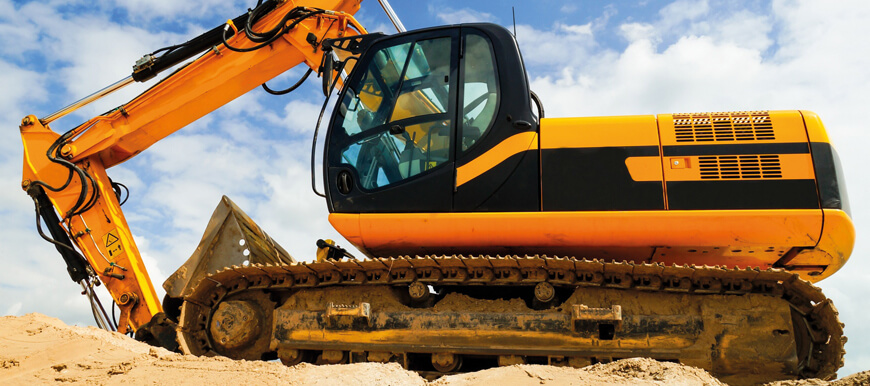The Power of Mobile Hydraulic Hydraulics
What Are Mobile Hydraulic Hydraulics?
Mobile hydraulic hydraulics, often simply referred to as "mobile hydraulics," are systems that use hydraulic fluid to transmit power and control motion in mobile applications.
An important parameter for satisfying the constantly increasing demands in terms of:
- extreme pressures
- demanding temperature profiles
- increasingly compact designs
- increasingly globally defined operating conditions
- lowest failure rates
- longer service lives
- stricter emissions standards
These applications encompass a wide range of vehicles and equipment, including:
- Construction machinery
- Agricultural equipment
- Material handling vehicles
- Commercial and industrial vehicles
- Emergency response vehicles
- Recreational vehicles
Mobile hydraulic systems are favoured in these applications because they offer several key advantages.
Advantages of Mobile Hydraulic Hydraulics
High Power Density: Hydraulic systems can deliver a high amount of power relative to their size and weight, making them ideal for mobile applications where space is limited.
Precise Control: Hydraulic systems offer precise control of motion, allowing for smooth and accurate movements of heavy loads and machinery.
Durability: Mobile hydraulic components are built to withstand rugged conditions and heavy use, ensuring long-term reliability.
Efficiency: Hydraulic systems are highly efficient, with minimal energy loss during power transmission, contributing to fuel savings.
Safety: Hydraulic systems can provide fail-safe braking and load-holding capabilities, enhancing safety in mobile applications.
Key Components of Mobile Hydraulic Systems
To understand how mobile hydraulic systems work, it's essential to familiarise yourself with their key components:
1. Hydraulic Fluid
Hydraulic fluid, typically hydraulic oil, serves as the medium for transmitting power in mobile hydraulic systems. It's chosen for its lubricating properties, resistance to heat, and ability to maintain consistent viscosity.
2. Hydraulic Pump
The hydraulic pump is the heart of the system. It pressurizes the hydraulic fluid, creating the force necessary to power various hydraulic components.
3. Hydraulic Actuators
Actuators are responsible for converting hydraulic pressure into mechanical motion. In mobile applications, you'll commonly find hydraulic cylinders and hydraulic motors.
4. Valves and Control Systems
Hydraulic valves and control systems manage the flow of hydraulic fluid, directing it to specific actuators and controlling their movement. These components provide the precise control essential for mobile machinery.
5. Reservoir
The hydraulic reservoir stores hydraulic fluid, ensuring a continuous supply to the system. It also helps dissipate heat generated during operation.
6. Filters and Filtration Systems
Filters are critical for maintaining hydraulic fluid cleanliness. They prevent contaminants from entering the system, which can damage components and reduce efficiency.
Applications of Mobile Hydraulic Systems
Mobile hydraulic systems are versatile and find applications in various sectors, each benefiting from the unique advantages they offer:
1. Construction and Earthmoving
Construction machinery, such as excavators, backhoes, and cranes, rely heavily on mobile hydraulic systems to handle heavy loads, dig trenches, and maneuver in tight spaces. The precise control and high power density of hydraulics make them indispensable in the construction industry.
2. Agriculture
Agricultural equipment like tractors, plows, and harvesters use hydraulic systems for tasks such as lifting, lowering, and controlling implements. The ability to adjust equipment on the go and maintain consistent control is vital in farming.
3. Material Handling
In warehouses, distribution centers, and manufacturing facilities, forklifts, conveyor belts, and automated material handling systems depend on mobile hydraulic hydraulics for efficient movement and precise control.
4. Transportation
Commercial vehicles like bin lorries, fire trucks, and delivery vans use hydraulic systems for tasks such as compacting waste, extending ladder systems, and operating hydraulic lifts. These systems enhance the functionality and safety of these vehicles.
5. Off-Highway and Mining
Heavy-duty off-highway vehicles, including mining trucks and bulldozers, rely on the robustness and power of mobile hydraulic systems to operate in extreme conditions and handle massive loads.
Driving Innovation in Mobile Hydraulic Hydraulics
As technology advances, so does the field of mobile hydraulic hydraulics. Several trends and innovations are shaping the future of these systems:
1. Electrification and Hybrid Systems
The integration of electric and hydraulic technologies is gaining traction. Hybrid systems are being developed to combine the efficiency of electric power with the precision and power density of hydraulics.
2. Intelligent Control Systems
Advanced control systems, often incorporating sensors and data analytics, are being used to optimize the operation of mobile hydraulic systems. These systems can adjust parameters in real-time to improve efficiency and reduce wear.
3. Energy Efficiency
Efforts to reduce energy consumption are ongoing. Innovations in hydraulic pump technology and the development of regenerative systems aim to make mobile hydraulic systems even more energy-efficient.
4. Environmentally Friendly Fluids
Research into biodegradable and environmentally friendly hydraulic fluids is ongoing. These fluids aim to minimize environmental impact in case of leaks or spills.
5. Enhanced Safety Features
Mobile hydraulic systems are being equipped with additional safety features such as load-sensing technology, anti-collision systems, and fail-safe mechanisms to improve operator safety.
Conclusion
Mobile hydraulic hydraulics have become the backbone of countless industries, enabling the efficient movement of heavy machinery and equipment. Their high power density, precise control, and durability make them indispensable in applications ranging from construction and agriculture to material handling and transportation. As technology continues to evolve, mobile hydraulic systems are poised to become even more efficient, environmentally friendly, and safe. The future of mobility depends on the power of mobile hydraulic hydraulics, driving innovation on wheels and setting the stage for a more productive and sustainable world.
At VHS Hydraulic Components we have a vast amount of stock in-house to help you with your mobile hydraulic solutions.
To enquire about your mobile hydraulic requirements and talk to our experts, please contact VHS Hydraulic Components on: 0114 276 4430 / E: info@www.hydraulic-components.net or visit our website at: https://www.hydraulic-components.net.





 No Minimum Order
No Minimum Order















